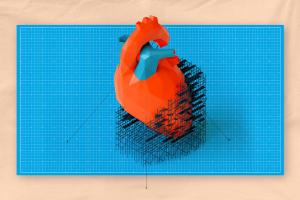
New research from UVA Health scientists seeking drugs that can trigger the regeneration of heart tissue after a heart attack say their efforts show promise and may lead to future treatment options.
The team, led by researcher Jeff Saucerman, previously developed a method to identify drugs that might make new cardiomyocytes, the heart cells responsible for pumping blood. In their recent follow-up work, the researchers analyzed five of the 30 compounds they initially identified to determine how the compounds regenerate cardiomyocytes, which could help replace damaged heart tissue.
The scientists say they gained new understanding of how the compounds work in heart cells, which will be invaluable in developing drugs to treat or reverse heart damage and heart failure. The potentially fatal condition affects more than 5 million Americans.
Once you lose cardiomyocytes after a heart attack and form a scar, there’s usually no going back.
“Once you lose cardiomyocytes after a heart attack and form a scar, there’s usually no going back,” said Saucerman, of the University of Virginia’s Department of Biomedical Engineering, a joint program of the School of Medicine and School of Engineering and Applied Science. “These compounds are promising in their potential of producing new cardiomyocytes to repopulate the heart.”
Irreversible Heart Damage?
Heart failure occurs when the heart loses the ability to pump enough blood to meet the body’s needs, leading to weakness, fatigue, shortness of breath, fluid buildup in the lungs and other symptoms that rob patients of their quality of life. It is irreversible and often fatal.
Heart failure can be triggered by heart attacks and other conditions that damage the heart tissue. Doctors currently have no way to repair this damage because the body stops making cardiomyocytes shortly after birth. Saucerman and his team are eager to find drugs that can restart that natural production line.

Working with scientists from pharmaceutical company AstraZeneca, the UVA researchers combined a traditional approach – looking at live cells with microscopes – with advanced image-processing algorithms. This approach allowed them to identify 30 compounds that triggered cardiomyocyte production in culture dishes.
While promising, the scientists needed a better understanding of the effects the drugs would have – how, precisely, they might stimulate cardiomyocyte production. So, the UVA team selected five different compounds that acted on different cellular targets and set out to find answers.
The scientists were uncertain how the compounds worked because they targeted proteins unrelated to previous studies on cardiomyocyte production. To take a broader view, the researchers looked at the expression of all of the genes in the genome as well as a large set of proteins.
Using machine learning, they connected the data into a network to explain the cascade of effects the compounds would cause. They found the drugs acted in similar ways to promote cardiomyocyte production and did so without toxicity – a promising sign.
The new insights bring the scientists closer to translating their lab work into new treatments.
“Based on these results, we’re now assembling the data into a large-scale computational model of cardiomyocyte production, as well as testing selected compounds in animal models,” said Saucerman, who is also a part of UVA’s Robert M. Berne Cardiovascular Research Center. “Normally, our ability to produce new cardiomyocytes is lost shortly after birth. One day, I hope new drugs can restore this regenerative capacity to treat heart attacks.”
The research was supported by AstraZeneca, a grant from the UVA-AstraZeneca Strategic Cardiovascular Alliance, UVA’s Pinn Scholar Award and the National Institutes of Health.